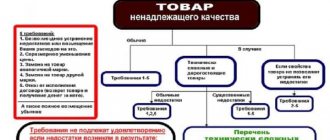Judicial protection of consumer rights (Article 17)
Article 17 of the Russian Federation Law on the Protection of Consumer Rights regulates the judicial procedure for resolving civil disputes between the seller, on the one hand, and the client, on the other.
This article consists of three points:
- Defines the judiciary as one of the instruments designed to protect consumer rights.
- Establishes the court to which a claim may be filed.
- Prescribes the exemption of the plaintiff from paying state fees when filing an application.
Right to quality of service
Similar rights are granted to the consumer in case of provision of low-quality services, violation of deadlines for the completion of work (provision of services) or in the case of performance of work with defects (Article 15, paragraph 1 of Article 18, Article 19, paragraph 1 of Article 23, Art. Articles 28, 29 of Law No. 2300-1).
The consumer’s right to product quality also includes the following rights (Article 6, paragraph 1 of Article 18, Article 21, paragraph 1 of Article 29 of Law No. 2300-1):
• for repair and maintenance of the product during its service life;
• replacement of goods of inadequate quality with goods of proper quality;
• a proportionate reduction in the value of the goods in the event of detection of defects in the goods that the seller did not report;
• free elimination of product defects;
• refusal to execute the sales contract and return of the amount paid for the goods.
The consumer’s right to quality of work (service) includes, in particular, the following rights (Clause 1, Article 29 of Law No. 2300-1):
• for the free elimination of deficiencies in the work performed (service provided), the free production of another item or the repeated performance of the work;
• reduction in the price of work performed (service provided) if deficiencies are discovered in it.
Arbitrage practice
A client's appeal to court to protect his rights is a fairly common phenomenon today. Let us examine in more detail the entire procedure for resolving a conflict between the seller and the buyer.
Reasons for appeal
The grounds for protecting consumer rights in court are given in Federal Law No. 2300-1.
These include:
- Inadequate quality of goods sold or services provided to the client;
- Consumer safety is not ensured when using the purchase;
- The necessary information about the product - how to use it, operational and technical characteristics, expiration dates - is not provided.
Expert opinion
Anna Fedorova
Lawyer, ready to answer your questions
Ask me a question
If the above facts are discovered, the seller, product manufacturer or service provider shall be held liable. Depending on the severity of the consequences, liability can be civil, administrative or criminal.
Where to contact
In case of violation of consumer rights, the client has the right to appeal to the following courts:
- At the buyer's place of residence.
- At the address of the location of the organization (branch) that sold the low-quality product or provided the low-quality service.
- At the place of residence of the private entrepreneur.
These standards are prescribed in clause 2 of Article 17 of Federal Law No. 2300-1.
Procedure
The judicial procedure for protecting consumer rights consists of three main stages:
- Filing a claim with a court.
- Consideration of the case by a judge in the manner prescribed by the Civil Code of the Russian Federation.
- Making a court decision on the protection of consumer rights.
An important aspect before filing a claim is collecting the necessary evidence. The court makes decisions based on the evidence provided by the parties that they are right.
Therefore, when preparing for a court hearing, the client should be armed with documentary evidence of the validity of his claim. These may include the conclusions of a technical expert, cash receipts, witness statements, photographs and video materials.
Filing a claim
A claim in court must be drawn up in accordance with the legal procedure accepted in the country. The application is written or printed on a sheet of A-4 format.
The document structure looks like this:
- In the upper right corner the court to which the claim is filed, the details of the plaintiff and the defendant are indicated;
- The main part of the text describes in detail, but without literary excesses, the circumstances of the conflict. It is indicated from whom, when and at what price the low-quality item was purchased (service received). Describe the harm caused to the applicant as a result (material, moral);
- Next, demands are put forward to the court: to recover compensation from the seller, to force the exchange of a defective purchase, and so on;
- Specify the price of the claims. Usually this is the cost of the purchased product, the service provided, the moral damage incurred in monetary terms;
- When some additional documents are attached to the claim, it is recommended to indicate a list of them. This way you will protect yourself from their loss by court office employees;
- At the end of the application, the date of its preparation and the personal signature of the plaintiff should be indicated.
A claim is filed with the court office along with the accompanying documentation.
Judicial act
Based on the results of consideration of the case on its merits, the judge makes a ruling on the claim.
The decision of the consumer protection court is formalized in the form of an official document, which comes into force after the end of the period allotted for the appeal.
The judge may, depending on the circumstances of the case, satisfy the claims of the injured client in full, in part, or reject them altogether.
5. Abuse of rights
All of the above features of consideration of cases involving consumers, aimed at protecting the “weaker” party of the trial, often lead to the so-called abuse of law, to the point where the purpose of going to court is not the restoration of violated rights and interests protected by law, but the desire to obtain certain material benefit. Sometimes judges already at the initial stage of the proceedings determine whether the consumer-plaintiff is a bona fide participant or is pursuing the goal of enriching himself, and make appropriate conclusions.
Despite the fact that the good faith of participants in civil legal relations is assumed, according to Art. 10 of the Civil Code of the Russian Federation, it is not allowed to exercise civil rights solely with the intention of causing harm to another person, to act in circumvention of the law for an unlawful purpose, as well as other deliberately dishonest exercise of civil rights (abuse of law).
The consequence of an established abuse of right may be a refusal to protect a person's rights in whole or in part . In addition, if the abuse of right resulted in a violation of the right of another person, such person has the right to demand compensation for losses caused by this .
Often, when going to court, a plaintiff is guided by considerations of “getting justice,” without always paying due attention to the weight of the evidence at his disposal for his position. Undoubtedly, the categories of establishing justice and truth may be worthy of respect, however, please note that filing a claim in court should always be a deliberate measure, taking into account all possible options for the development of the legal process, including questions about the subsequent distribution of legal costs , note, both sides After all, if the consumer makes unreasonable demands, and the court refuses to satisfy the claim, the consumer may be charged legal expenses for the services of a representative incurred during the consideration of the case in favor of the supplier/manufacturer/performer who suffered from the lawsuit, and as in the first case, and in subsequent instances.
Is compensation for moral damage expected?
Compensation to the victim for moral damage caused is provided for in Article No. 151 of the Civil Code of the Russian Federation. The main condition for payment of compensation here is the fact that the client suffered moral suffering due to the fault of the seller, service provider or manufacturer.
Expert opinion
Anna Fedorova
Lawyer, ready to answer your questions
Ask me a question
The amount of compensation payments is set by the judge, based on the degree of guilt of the defendant and the amount of moral damage caused.
Right to product safety
The safety of a product (work, service) presupposes its safety for life, health, consumer property and the environment under normal conditions of its use, storage, transportation and disposal, as well as the safety of the process of performing work (providing a service) (preamble of Law N 2300-1) .
The consumer has the right to ensure that the product (work, service) does not cause harm during its service life or shelf life, and in their absence - for ten years from the date of transfer of the product (work) to the consumer.
Security is ensured by a system of mandatory requirements enshrined in the legal regulations (clauses 1, 2, article 7 of Law No. 2300-1).
The consumer is guaranteed full compensation for damage caused to life, health or property due to defects or failure to ensure the safety of goods (work, services), as well as in connection with the use of materials, equipment, tools and other means necessary for the production of goods (performance of work, provision of goods). services).
Losses are compensated in excess of the penalty (penalties) established by law or contract. In addition, payment of a penalty and compensation for damages do not relieve the person who has violated the consumer’s right from fulfilling in kind the obligations imposed on him to the consumer (clauses 2, 3 of Article 13 of Law No. 2300-1; clause 31 of the Resolution of the Plenum of the Supreme Court RF dated June 28, 2012 N 17).
Losses caused to the consumer in connection with the recall of goods (work, services) are also reimbursed in full (clauses 2, 5, article 7, clauses 1, 4, article 14 of Law N 2300-1).
Additional Information
The judicial procedure for protecting consumer rights is not the only possible one. The affected client also has the right to contact the territorial bodies of Rospotrebnadzor. This organization has the authority to understand the essence of the conflict that occurred between the seller and the client.
If the seller (manufacturer) is found to be at fault, Rospotrebnadzor employees may impose a penalty on him or force him to accept the defective product back. Also, Rospotrebnadzor employees have the right to act in court hearings as independent plaintiffs against negligent sellers.
Attention! Due to recent changes in legislation, the legal information in this article may be out of date!
Our lawyer can advise you free of charge - write your question in the form below:
Right to product quality
The right to quality ensures that the consumer extracts the declared consumer properties from the product (work, service).
Any product or service must comply with the stated characteristics. If the purchased goods, work, or service do not have a clear description, then they must be suitable for the purposes for which they are usually used (Article 4 of the Law of 02/07/1992 N 2300-1).
The presence of unspecified defects in the goods is the basis for returning the goods and submitting the following demands to the seller (manufacturer, authorized organization or authorized individual entrepreneur, importer) within the established time frame: compensation for losses caused as a result of the purchase of goods of inadequate quality, compensation for moral damages, and also pay a penalty.
Consumer right to information
The consumer is guaranteed the right to demand the provision of necessary and reliable information, in particular (clauses 1, 3 of Article 8, clauses 1 - 1.2 of Article 9, clauses 1, 2 of Article 10, clause 3 of Art. 11, paragraph 4, article 19, paragraphs 2, 3, article 26.1 of Law No. 2300-1):
• about the product (work, service), including the main consumer properties, mandatory confirmation of the product’s compliance with the requirements of technical regulations, price and terms of purchase;
• on the warranty period (if established), service life or shelf life of the product (work), on the rules and conditions for the effective and safe use of the product (work, service);
• about the manufacturer, performer, seller, including name, address, identifiers in the form of OGRN, OGRNIP numbers, information about the license and operating mode;
• deadlines for filing claims regarding product defects.
When concluding sales and purchase agreements and contracts for the performance of work (rendering services), information about their conditions must be brought to the attention of the consumer in a clear and accessible form (Clause 2 of Article 8 of Law No. 2300-1).
The information provided to the consumer about goods (works, services) must ensure the possibility of their correct choice (Clause 1, Article 10 of Law No. 2300-1).
If unreliable or incomplete information led to harm to the life, health and property of the consumer or to an incorrect choice, then the consumer has the right to demand termination of the contract and compensation for harm and losses incurred (clauses 2, 3 of Article 12 of Law No. 2300-1).








